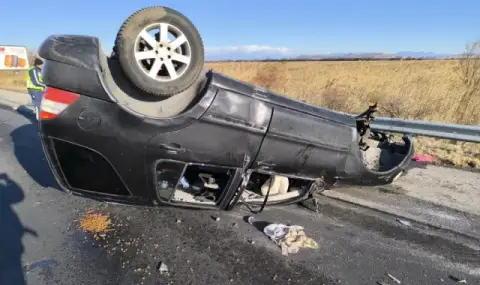< strong>A chain accident between four cars and a truck on the “Thrakia“ highway. took a victim near Pazardzhik on Saturday. Three were injured, one of them life-threatening. The traffic was blocked for hours, but by chance or not a doctor happens to be at the scene of the accident.
The neurosurgeon at UMBAL Burgas, Dr. Svetoslav Todorov, was traveling to Sofia when he saw the accident. He doesn't think twice, stops and helps.
“Around 7 p.m. before Pazardjik, cars suddenly stopped with emergency lights. Before long I let them go too and after a few hundred meters I saw a really bad accident, several overturned cars, a woman who had died and a badly injured man who was in the most serious need of help. The police were already there and had called the emergency teams, the doctor told bTV.
Dr. Todorov performs a quick examination of the victim, who has a brain injury, breathing difficulties, but is conscious and adequate.
According to him, in such situations you should know very well what to do, but also what not to do. With his actions, he managed to shorten the working time of his colleagues.
“Part of the people and the victim himself wanted to be moved, this is contraindicated because more serious neurological complications can happen if he has broken vertebrae, as it later turned out. I waited for the CSMP teams, provided psychological support, which at this moment is essential, and advised people on what to do so that we do not make mistakes. The move was when the teams came. I applied the cervical arm and with the help of the people we put him on the spinal board and he was brought into the ambulance. They called a second ambulance for the less injured and I asked myself if I could help them in the ambulance as well, says Dr. Todorov.
This is not the first time that Dr. Todorov happens to be at the scene of an accident and helps the injured in accidents.
„In 2017 again on AM “Thrace“ my colleague and I were traveling on vacation and we witnessed another overturned vehicle. Then perhaps the incident was even more recent. Unfortunately, three girls were injured, one of them died. The girl to whom we provided the most substantial help, we met and keep in touch. Fortunately, she survived, she had a severe head injury, a spinal cord injury. We had the pleasure of meeting the colleague with this girl, who today is alive and healthy and developing," says the neurosurgeon.
Dr. Svetoslav Todorov reminds how important it is for every car to be equipped with a first aid kit, a reflective vest and a triangle and shares the rule of the four “O“ in the event of an accident.
„In the first place is safety for ourselves, to stop in a safe place, sound an emergency signal, put on a reflective vest, put on the triangle and then help people. In the second place is to assess the condition of the victim, in the third place – calling 112. Many people do it in the first place, which is wrong. We need to know the number of victims, their main injuries, in order to give the correct information and for the CSMP to be prepared and know how many ambulances to send. In fourth place – providing first aid, dressings of actively bleeding wounds, immobilization, moving the victim”, advises the neurosurgeon.
He explains the huge road traumatism with human imprudence. According to him, in most cases, people are to blame for the occurrence of road accidents.
„Yes, we don't drive on perfect roads, nor do we walk on perfectly marked footpaths, but we live in this world and we have to live up to it. We have to be extremely reasonable. If a person drives at a normal speed, is sober, obeys traffic rules, restrictions, traffic light colors and pedestrians are reasonable and look around before crossing, accidents would decrease”, comments Dr. Svetoslav Todorov.
